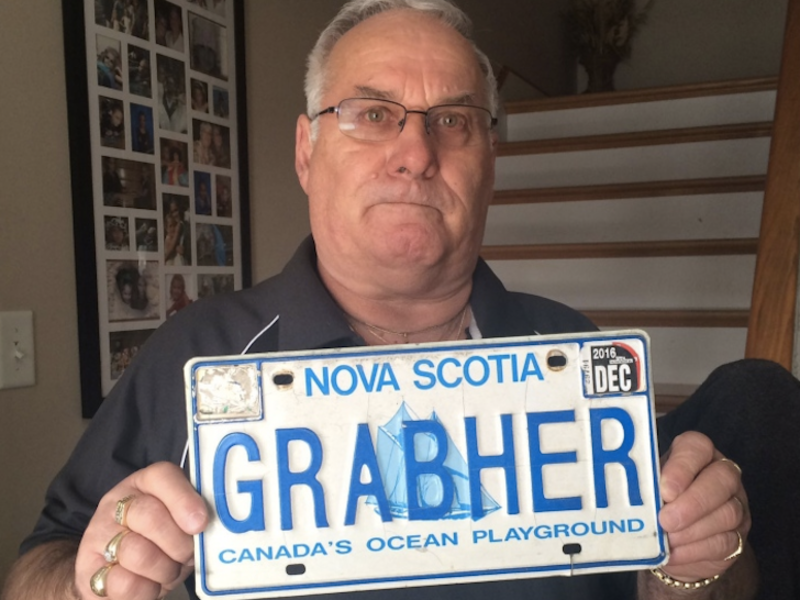|
By Anthony Savonarota As you may recall from a few months ago, a senior Nova Scotian citizen of German ancestry by the name of Lorne Grabher, of whom has been using a vanity license plate with his surname emblazoned on each car he has owned since the early 1990’s, woke up one December morning to find a letter from the Nova Scotia Registry of Motor Vehicles declaring his license plate registration I.D. inadmissible for further renewal within the coming year. To Grabher’s surprise, the letter detailed that the reason was not his fault, but rather due to a sole complaint the Ministry had received in late October by an anonymous, offended caller who saw the license plate and described it as a hateful promotion of misogyny, and even sexual violence against women. The Ministry concluded the letter by stating that although this complaint was the first one directed at Grabher in the twenty plus years he (not to mention some members of his family inter-provincially) have been using license plates with their last name, because the context of a surname is not available to the general public who routinely view it, it can very easily be “misinterpreted a socially unacceptable slogan" by being a hybrid of ‘grab’ and ‘her’. As a result, they felt it was justified to discontinue the allowance of using the vanity license plate. Grabher was taken aback, and appalled at the Ministry’s decision. He said he originally bought the plate as a gift for his father's 65th birthday. When his father passed away in the early 1990s, the plate purposely remained in the family to honour their father’s routinely taught lesson that you should always be proud of your name and where you came from. "I've never once had anybody come up to me and say they were offended," Grabher said to the CBC. "They would look at it and say, 'Am I reading this right?' And I would go, 'Yes.' And they would go, 'Is this your last name?' And I would go, 'Yes.' And they would always just give a little chuckle."' In the first few months following Grabher receiving the letter, he purposely contacted local media outlets in an effort to both bring attention to the story and possibly put public pressure on the Ministry to recant their choice to prohibit Grabher’s use of the plate. However, despite the story managing to circulate well across Nova Scotian communities and partially within other provinces, the Ministry did not back down. In fact, they doubled down, with one spokesperson by the name of Brian Taylor addressing the situation by noting to the public and Canadian media that their decision is completely in their right; licence plate applications include a notice to applicants that the province can refuse the personalized plates on the basis that the wording is socially unacceptable, offensive, or not in good taste. The publicity Grabher’s individual case has received has led it to actually being interpreted by some not as a personal problem, but a political dispute. Considering the exact month the complaint was issued, many believe it may have stemmed from the at-the-time very recent controversy south of the border, often dubbed the “October Surprise”, concerning a controversial 2005 ‘Hot Mic’ conversation featuring President Trump. Grabher has said he is familiar with the infamous recording of U.S. President Donald Trump using offensive language to say he wanted to "grab her" in reference to a woman. But Grabher said he is not Trump, and that has never been the the intention of his plate. It seemed that Grabher’s initial resistance and pleas were to be ultimately ineffective. However, his story continued to gain traction, and not just on a provincial, but national and even international level. Grabher has received countless messages and direct phone calls of supporters urging him to fight back through Canadian justification. One of those calls was even from Kurt Fischer, the mayor of the city Lustenau within Austria, and Grabher’s story event went on to be covered on American news outlets such as Fox News and online in several India and U.K. based news publications. As a result of the encouragement from people who have contacted him, Grabher has recently declared that he will be confronting the matter directly in court. Grabher has began preparing for his eventual court dispute by retaining the services of the Justice Centre for Constitutional Freedoms in Alberta. The centre has sent a letter to the Nova Scotia government calling the decision to revoke Grabher’s licence unconstitutional and “an affront to the dignity of Canadians, particularly those Canadians who are not of Anglo-Saxon descent.” In the meantime, he has a Grabher licence plate his son sent him from Alberta. He's put it on the front of his car. The letter went on to say it is becoming a major cultural problem that “Canadians are becoming increasingly less tolerant of free expression. You have more and more people who believe that they have a legal right to go through life without seeing or without hearing things they find to be offensive.”
|
Recent Posts
Categories
All
Archives
February 2022
|
|
GET THE APP!
Listen to VIBE 105 anywhere you go!
|
OUR STATION
|
TUNE IN RADIO
|
STAY CONNECTED
|
Copyright © 2021 Canadian Centre for Civic Media and Arts Development Inc. Except where otherwise noted, presentation of content on this site is protected by copyright law and redistribution without consent or written permission of the sponsor is strictly prohibited.






 RSS Feed
RSS Feed


